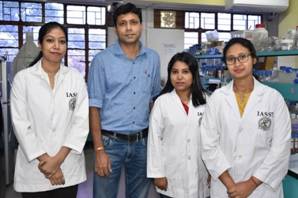Ministry of Science & Technology
Scientists identify bacteria that can replace fertilizers & fungicides in tea plants
Posted On:
04 MAR 2020 3:45PM by PIB Delhi
Tightening norms on pesticide use in many countries have often harmed team export. Now Indian scientists have come up with a solution to reduce the use of such chemicals in team plantations.
Researchers at Institute of Advanced Study in Science and Technology (IASST) Guwahati, an autonomous institute under Department of Science & Technology, have found significant plant-growth-promoting and antifungal activities of endophyticactino bacteria associated with Tea plant and related genera, Eurya to find potent plant growth-promoting strains. Application of endophytic Actinobacteria could reduce chemical inputs in Tea plantation.


The team led by Dr. Debajit Thakur from IASST isolated 46 endophyticactino bacteria (predominantly free-living microorganisms) found in diverse environments that lives within a plant for at least part of its life cycle without causing apparent disease associated with Tea plants and characterized through molecular techniques. Out of 46 isolates, 21 isolates inhibited the growth of at least one test fungal phytopathogens and strains SA25 and SA29 exhibited broad-spectrum antifungal activity.
Most of the endophyticactino bacteria isolates having antifungal activity showed presence of chitinase, NRPS (Nonribosomal peptides synthetase) or PKS-1 (Polyketide Synthase) gene, suggesting the presence of distinctive mechanisms to inhibit the growth of pathogenic plant fungi. Actinobacterial strain SA1, T1LA3, and SA14 were further tested for their efficacy in promoting the growth of commercial tea clones namely, TV1, TV9, TV18, and TV22 in nursery conditions. All the endophytic isolates tested showed significant differences in terms of plant growth-promoting parameters in the treated plants compared to untreated control.
This research finding confirms that endophyticactino bacteria have the potential to exhibit multiple growth-promoting traits such as IAA production, phosphate solubilization, siderophore production and so on that positively influence tea growth and production and can hence be used in the management and sustainability of Teacrop. The above mentioned work is publicised in the peer-reviewed scientific journal Frontiers in Microbiology.
Tea (Camellia sinensis) plays an important role in the Indian economy as a major portion of the tea produced is exported. However, in the recent years, due to higher demand of chemical residue-free made tea by the importing countries has led to a decline in the export of tea. The present study attempts the use of endophyticactino bacteria having plant beneficial characteristics to reduce and replace the use of chemical inputs in the tea industry.
****
SNC/KGS (DST)
(Release ID: 1605133)
Visitor Counter : 1123